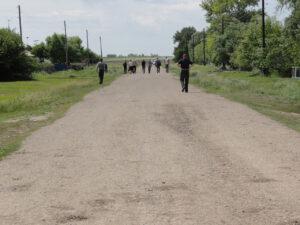First, the background information: on June 14, 1941, more than 14,000 people were forcibly deported by Stalin’s regime from Latvia to Russia – families were separated, the men sent to hard labor camps, women and children sent to work and fend for themselves on the Siberian taiga and tundra. Teachers, doctors, government workers, members of the Latvian national guard, active members of their communities – these were their only “crimes”. The vast majority of the men died of hunger, illness, exposure, and/or were sentenced to death as “enemies of the state” and shot. Far too many of the women and children died as well, of the same causes. Another 40,000+ people were deported eight years later in a second round of deportations by the Soviet regime.
Latvia
Observations on a transition
When I came to live here three and a half years ago, I was familiar with the typical list of an outsider’s superficial observations of Latvia: frequent gruff answers, bureaucratic absurdities, a nation-wide fear of drafts, and so on. These things were often frustrating, but as already said, superficial. Something you’d better get used to…or move back.
Veļu laiks, Dievaines, or the Time of the Spirits
VEĻU LAIKS — DIEVAINES
Late autumn – October, November – the leaves have fallen, the field work is done, the weather is often foggy, there is time for reflection…. This time of year, once the wolves begin to howl in autumn, is called Veļu laiks (“The Time of the Spirits”) or sometimes Dievaines. The same term or variations of it, such as Veļu vakars, is also used to denote a specific day of remembrance and of honoring the deceased. This is not really a traditional Latvian holiday in the sense of solstices and equinoxes. It doesn’t even fall on a specific date. Rather, Veļu vakars, a very personal and private doing, can take place anytime during mid to late autumn.
Sventaja – Šventoji
[As the result of a 1921 international border agreement, half a county of ethnically Latvian inhabitants along the Baltic Sea coast ended up in Lithuania instead of Latvia. One positive outcome of this situation that culturally isolated the people there is that their singing traditions survived more or less intact until very recently. For the past 20+ years a couple I know here in Riga has been visiting Sventāja (Šventoji in Lithuanian), the main Latvian village in the area, getting to know the people and recording their songs. A CD + DVD of these field recordings was finally released in late summer of 2010. Since the folklore ensemble I sing with has learned many of these songs, I decided to go to the CD opening event in Sventāja in October 2010, spending the night with friends in Liepāja on the Latvian side of the border. I was curious to see where the songs had come from, hear the local dialect, and maybe even meet some of the original singers.]
Singing in Šķaune
About 20 years ago a young couple on an outing to the far reaches of Latgale [eastern Latvia] met and recorded a couple of local traditional musicians and singers. Ilmārs and Janta Mežs kept in touch with one of the musicians – a violin player – and this past summer Janta invited me and another friend along to Latgale to meet him and to see whether there were any other traditional singers and musicians left in that area. We focused on the town of Šķaune and its surrounding area, which is right on the Latvian border with Belarus, about 20 miles east of Dagda. First, though, we needed to apply for permits to enter the border area and then present them at the border patrol office in Šķaune, or else face searches and reprimands by patrolmen. Apparently a lot of smuggling goes on across the Belarusian border, which is also a frontier of the European Union and the newly expanded Schengen free-travel zone.
A Colorful Bunch — Intro to the Latvian Folklore Movement
“Folklorists” are often considered a strange lot, both among Latvians abroad and in Latvia proper. Maybe even more so in Latvia. You’d think that if Latvians wanted to distinguish themselves from other nations, then folklore would be their piece de resistance. But it’s disheartening to see that the unifying enthusiasm for folk songs, folklore, and other things ‘Latvian’ of the late 1980s and early 1990s was just a passing phase for much of the nation. Be that as it may, I was born into a folky family and it’s stuck with me. So obviously, I looked to the folklorists for my niche here in Latvia as well.
